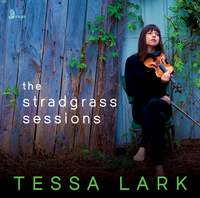Interview,
Tessa Lark on The Stradgrass Sessions
The eye-catching neologism "Stradgrass" - combining the Strad's classical pedigree with the folksy sounds of bluegrass - lets violinist Tessa Lark fly far above the limiting boundary-fences of "proper" genres...

How does it feel to have founded and named a whole new musical genre?
“Stradgrass” is just a fun term that developed for what I’ve been doing within the bigger, I’ll call it “anti-genre,” movement that has been developing for a couple decades now… so it’d be pretty ironic for Stradgrass to become a genre! Genres are categories for marketing, not for musicians, and the whole idea of Stradgrass is to encourage aural artists from all walks of life to collaborate and grow together.
If the compilers of a music dictionary asked you to define in a sentence what makes Stradgrass unique, how would you sum it up?
It’s the exploration of folk styles from a Classical lens, which is a less common practice than it is in the professional folk world.
Those classical and bluegrass strands have been interwoven for most of your life – did you ever feel like you’d have to choose one over the other?
The short answer is “no,” and I’m grateful for that. But I did choose to pursue formal classical training and, from there, continued to dip my toes into folk music. Nevertheless that question will be one I juggle for my entire career, but that’s why I love playing so many different styles - it keeps me curious and flexible!
Tessa Lark and Michael Cleveland play Michael Cleveland's Lazy Katie
Several of your own pieces here have, as you describe them, quite ad hoc origins – coming to you while on the move, on planes or trains! When it comes to capturing those moments of inspiration, are you a manuscript-paper person, or do you play things over on the instrument first and worry about the dots later?
I do a mix of everything because it all yields a specific result. Writing with my violin - and recording the noodles on a phone voice memo or writing down by hand - is the most efficient; composing at the piano is the most inspiring; and composing in my head is the most rewarding. Music software is amazing these days, but I try to use it only later in the process because the music can start to sound impersonal if created from the computer… and staring at the screen is so exhausting!
As you mention in the notes, the inclusion of a sprinkling of Bartók’s folk-inspired violin duos here was natural and inevitable. Do you think classically-trained musicians should put more “folk” spirit into their performances of this sort of music?
I’m not sure about “more” folk spirit, but they are folk dances and should absolutely be appropriately folksy! These are also, however, folk dances arranged by an extremely sophisticated Classical composer, so their style is a unique hybrid. Sierra and I added a few personal touches to our rendition of Bartok’s dances, and it felt right because of the altered instrumentation. I think a mark of excellent music is that the number of excellent interpretations can be infinite, and I’d apply that to Bartok’s music.
Is there anyone else doing the same sort of thing as you in this space between the Western-Classical and American-folk worlds?
The only part of this zone that seems truly new to me is the larger public that has begun to embrace the grey areas of music and styles outside of genre bounds. There are tons of artists who have been paving this path for decades. Dvořák was an early advocate for embracing American music within the Classical community through his beloved compositions, and nearly all the great composers we know were inspired by the folk idioms around them.
Every guest artist on The Stradgrass Sessions is wonderfully diverse in their stylistic explorations and influences, and there are more and more young artists who are excited to explore more ways to make music because of artists like Sierra Hull, Jon Batiste and Michael Cleveland. And I feel we all owe a lot of the exploratory freedom we enjoy now to Edgar Meyer, who humbly yet heroically has changed music in America and the world through his career and ever-expanding artistic vision.
Tessa Lark (violin)
Available Formats: CD, MP3, FLAC, Hi-Res FLAC



